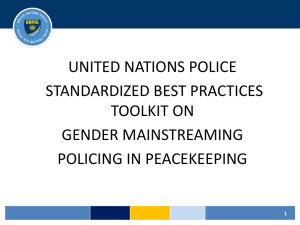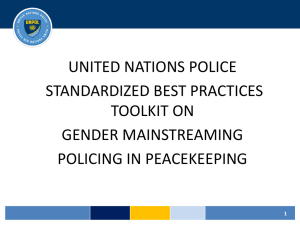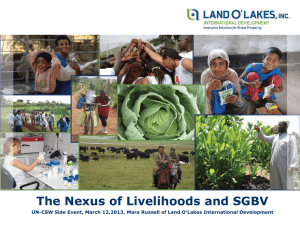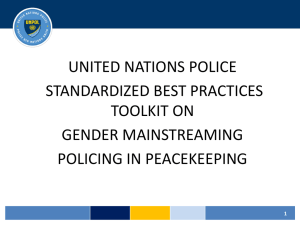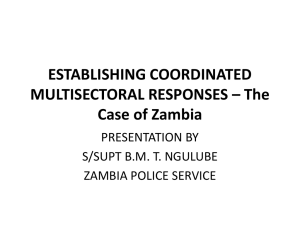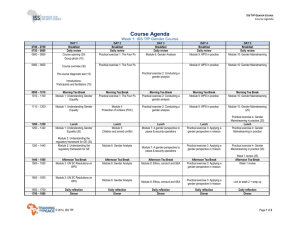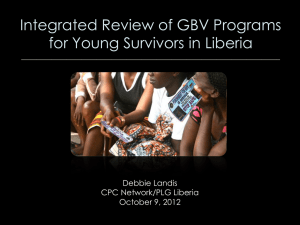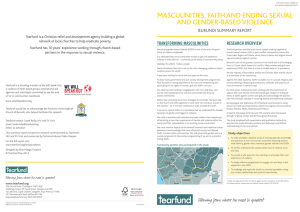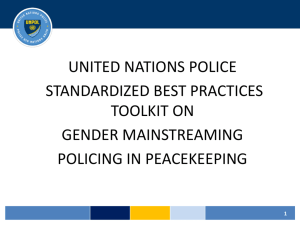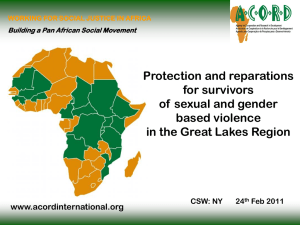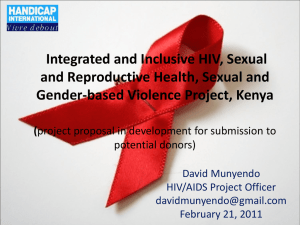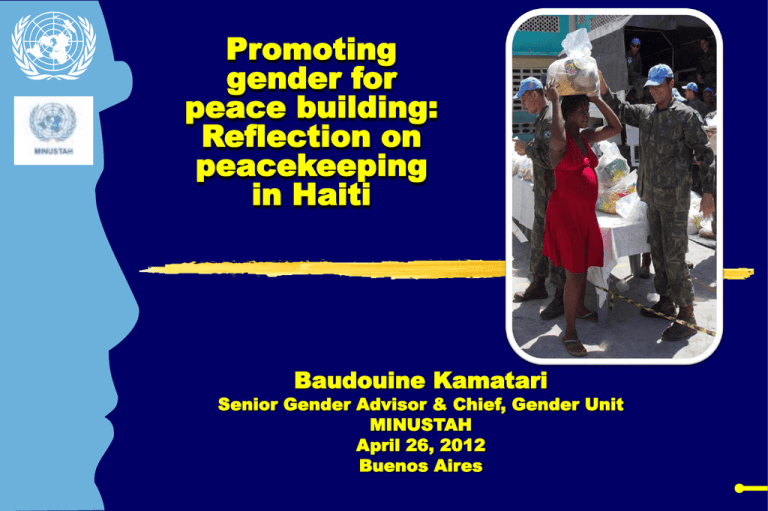
Promoting
gender for
peace building:
Reflection on
peacekeeping
in Haiti
Baudouine Kamatari
Senior Gender Advisor & Chief, Gender Unit
MINUSTAH
April 26, 2012
Buenos Aires
Presentation
• Haitian Context
• Mission’s Mandate
• Strategies and actions
• Challenges and recommendations
Haitian Demographic Context
A few demographic data:
• Population: 9 800 000
• Density: 352 inh./ km²
• 76% of the population
considered as poor
• Life expectancy: 54
Context• 3
Haitian political context:
• Some improvements since the earthquake
• Peaceful democratic transition
• No effective political dialogue between
executive and legislative branches
– Weakness of national institutions
– Fragile security transition
– Prevailing culture of violence
– Widespread corruption
– Criminalization of armed group
Context• 4
Haitian humanitarian context
• 490 000 people in Internally Displaced
People camps (from 1 700 000 in february 2010)
• Cholera epidemic
• High vulnerability to natural disasters
(532 000 cases, 7060 deaths)
Context• 5
Gender Considerations: Overview
• Ministry for Women Affairs
(1994)
• Allocated 2% of the national
budget
• Poverty and discriminations
• CEDAW (1981)
• Women’s organizations
weakened
Gender - Overview• 6
Gender Considerations: Women’s
Participation
• 5 women parliamentarians out of 99
• 1 woman Senator out of 30
• 3 women Ministers out of 18
• 4 women Secretaries of State out of 20
• 52/650of women judges (8% )
• About 8% of women in the National
Police
Gender Overview• 7
Gender Considerations: Security
of Women
• Widespread domestic violence
• Sexual violence as a means to
destabilize communities & assert control
• Few violence survivors refer to justice
• No comprehensive data collection
• No data = no problem = no policy
Gender - Overview • 8
MINUSTAH’s Mandate
• United Nations Mission for the
Stabilisation of Haiti
• UNSCR 1542 (2004)…2012 (2011)
• Security, rule of law and institutional
reform
• Protection of civilian population
Mandate• 9
MINUSTAH
In 2012, 7340 troops and 3241 police officers
% of
Female/
Average
per year
Military
Military Staff
UNPOL
Contingents
2011
2%
1.57%
11.76%
2010
1.76%
3.8%
8.3%
2009
1.6%
3%
3%
The mission will start downsizing from 2013
Mandate• 10
The importance of integrating
Gender in peacekeeping/SGBV
Poor data collection:
Victims do not report
SGBV crimes
Mostly anecdotal
evidences
Reflection of target
populations or zones
Difficult to analyze
trends or programmes
impacts
•
•
•
•
KOFAVIV
SOFA
PNH- Fort
Dmanche
Time span
2010
Jan-Jun 10
Before earthquake
Number of
reported
rapes
Time span
640
718
100
Jun- Dec 2010
After earthquake
170
4
Number of
reported
rapes
Time span
Number of
reported
rapes
Jan-Oct 2011
101
Gender Mainstreaming • 11
Gender Unit
1.MAINTREAMING OF GENDER INTO ALL
MISSION COMPOTENTS / ACTIVITIES
2.PROMOTE MAINTREAMING OF GENDER
IN KEY NATIONAL PROCESSES in the
context of Mission mandate (Rule of Law;
Governance)
Gender Mainstreaming •
12
MAIN STRATEGIES:
Internal
• Induction trainings
• Specific training sessions
• Training of trainers
• Gender Focal points
• (Components,
Sections & Regions)
Gender Mainstreaming • 13
• Gender Mainstreaming 14
MAIN STRATEGIES:
External
• Awareness campaigns
• Advocacy
• Training
• Institutional building (strengthening
•
women’s organizations and the Ministry
for Women’s Affairs)
Technical support for the development of
policies and legal framework
Strategies• 15
Strategies:
Women’s Participation
• Supporting women’s participation in decision
making
– 30% quota of women’s representation in decisionmaking
– Support to women candidates during elections
(threatened by
)
– Support to women parliamentarians (Caucus)
– Promotion of women’s participation in leadership
positions (Luxembourg funding project, Open
Day, etc.)
Strategies • 16
STRATEGIES:
Women’s security
• Protection of vulnerable people
– Prevention and awareness at community level/patrols in
IDP camps, IDP Gender Mobile
• Reporting – SOPs
• Joint security assessments – Gender
• Building capacity & women’s trust
• Trained UNPOL GFPts in all PC (nationwide)
Strategies • 17
STRATEGIES:
Security Sector and judicial Reform
• Legal and policy framework
– Law reform on Sexual and Gender Based
Violence
– National action plan
• Capacity building
– Training of security and judicial actors
– Support to the Haitian National Police’s
Coordination Nationale des Affaires
Féminines et Questions de Genre
Strategies • 18
• Gender training module for all cadets at
HNP
• Specialized SGBV Unit established –
headed by a female senior police officer
• 150 female police officer being trained
for the SGBV Unit - 23 promotion
• Space for reception of SGBV cases in
10 PC
• Training of investigators, judicial actors,
rd
free legal assistance actors, etc
Strategies • 19
Partnerships
• MINUSTAH Components & sections
• UNCT – UN Gender Thematic Group
• GoH – MCFDF
• Women & Men MPs Parliamentarians
• Women’s organizations
• Leaders
• Civil Society 0rganizations
Module 1 - Why • 20
Challenges and Recommendations
Peculiarity of Haitian crisis
No war
Conflict? Post-conflict?
There is not a 2 or more groups clash
Protracted and violent 25 year transition
after 30 years of dictatorship
Intra-community violence
Impunity and lawlessness
•
•
•
•
•
•
Challenges & Recommendations• 21
Challenges and Recommendations
• High turnover of military contingents and
various understanding of gender and
gender equality among peacekeepers
make gender mainstreaming difficult
Consistent pre-deployment training in line
with missions’ mandates, priorities and
needs
Challenges and recommendations• 22
Challenges and Recommendations
• What strategies can peacekeepers use
•
to respond to intra-community conflicts
and SGBV?
How can peacekeepers assist in seeing
and reporting trends and cases of
SBGV in communities for actions to be
taken by the police?
SGBV in military reporting & analysis as an indicator of insecurity.
Challenges and recommendations• 23
Challenges and Recommendations
• How can women in the infantry and the
cavalry help promote gender equality and
contribute to build trust among
women/girls & communities in the fight
against SGBV?
More women in peacemaking,
Incl. in infantry & cavalry
Challenges and recommendations• 24
Challenges and Recommendations
• The fight against SGBV strong political
leadership, commitment & consistency
• MINUSTAH will be downsizing while SGBV is
prevalent.
Clear position on SGBV
A military staff integrated with civilians and the
police on Gender/SGBV at the Gender Unit
Challenges and recommendations• 25
Challenges and Recommendations
• CIMIC activities respond to communities’
needs. It is necessary to involve all
stakeholders, especially women’s organization
in their design, implementation and evaluation.
CIMIC activities supported and designed to
respond to gender related national priorities
Challenges and recommendations• 26
Challenges and
Recommendations
SGBV means no security for women
• Include SGBV as an security indicator
• More women in infantry to built women’s
•
trust and confidence in reporting SGBV
cases
Promoting women’s participation decisionmaking including in military and police
components
Challenges & Recommendations • 27
Module 1 - Why • 28
Module 1 - Why • 29
Module 1 - Why • 30
• 31
Module 1 - Why • 32
• 33
Module 1 - Why • 34
Module 1 - Why • 35
Module 1 - Why • 36
Module 1 - Why • 37
Module 1 - Why • 38
Module 1 - Why • 39
Module 1 - Why • 40
Module 1 - Why • 41
• 42
Module 1 - Why • 43
Thank you for
your attention

